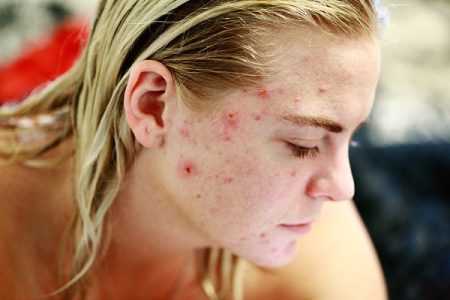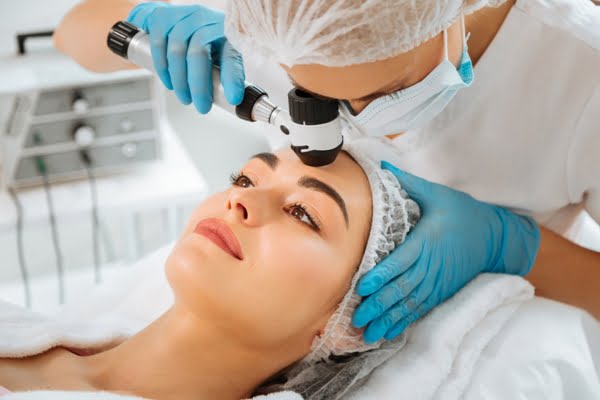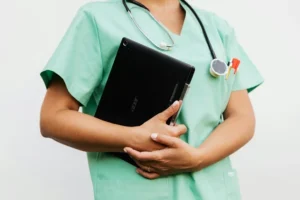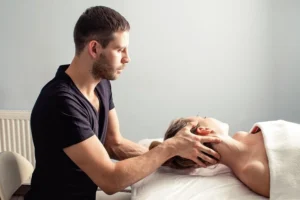Back Acne – Learn About Basics
- Updated on: Jul 25, 2024
- 4 min Read
By
- Published on Nov 13, 2018
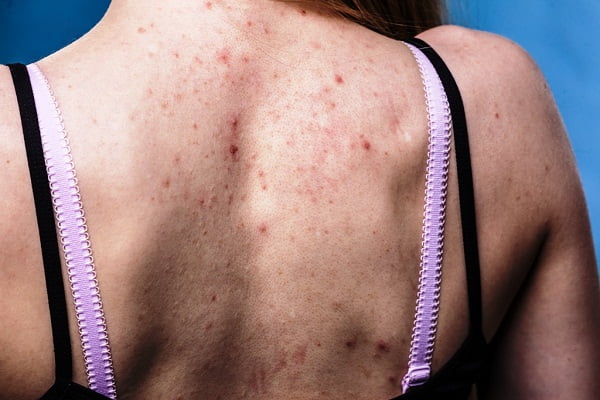

Overview of back acne
Acne can be challenging to treat, no matter from where you get it. Unfortunately, acne can happen at any age to anyone for several reasons. Face is not the only place where acne protrudes. It can affect any body part that has oil-secreting glands or hair follicles such as your back, chest, and shoulders. Back acne is a common form of acne and is also referred to as “bacne”. Having acne on the back and chest is a sign of severe acne problem.
What causes back acne?
Back has many sebaceous glands that secrete sebum, an oily substance. Sebum, along with dead skin cells and bacteria, can build up in the hair follicles on the back and clog them. A clogged follicle breaks down and forms an acne lesion, which causes back acne.
Check out images and info graphics for Acne.
Types of back acne
Bacne is widely categorized into two types – non-inflammatory and inflammatory.
Non-Inflammatory bacne
Common types of non-inflammatory back acne are:
Blackheads
It is also referred to as an open come done. When an open plugged follicle is situated on the surface of the skin and is clogged with dead skin and sebum, it forms a blackhead. The tip appears black because of a reaction between sebum and the air.
Whiteheads
Whiteheads are also referred to as closed comedowns. They develop when a plugged follicle stays closed and under the skin, forming a white bump of sebum and dead skin cells.
Inflammatory bacne
There are different types of inflammatory back acne as follows:
Papules
Acne lesions due to the inflammation of walls around skin pores are termed as papules. They appear as small pink bumps on the skin.
Pustules
These are also called as pimples. This type of acne is caused due to inflamed skin pores, and is filled with white or yellow pus with a reddened base.
Nodules
When an acne lesion develops deep below the surface of the skin, it can harden and form a large, painful nodule caused by irritated and clogged pores. This is called a nodule.
Cysts
Cysts are large, pus-filled acne lesions that are very painful when touched and can scar the skin caused by clogs occurring deep within the skin, resulting in white or red bumps.
Read: Acne Scars: Types, Removal, Treatment
How to prevent back acne?
You cannot prevent back acne completely, as the main factors that are responsible for it are not always controllable. Some of these factors are:
- hormonal changes
- genetic makeup of an individual
But one can reduce the chances of developing future back acne lesions by taking certain preventive measures such as:
By avoiding certain medicines
Some drugs, such as androgens (male hormones) and lithium, are known to increase the chances of developing acne. If you are taking any of these drugs, consult your doctor about possible alternative treatments.
Minimal use of oil-based skin care products
Avoid use of moisturizers, cosmetics, sunscreens, and other oily products on the back, as they can give rise to acne flare-ups. Use of non-comedogenic products can help prevent blackheads.
By decreasing pressure on the back
If you carry heavy equipment on your back, like shoulder pads that place pressure, you should alternatively use a clean cotton T-shirt under it for decreasing the pressure on the back due to the weight.
By wearing loose clothes
Tight clothes can trap dirt and sweat and rub it into the pores of the skin. Use of loose-fitting clothing let your skin breathe and helps wick away sweat.
Healthy diet
A healthy diet can affect our bodies in a variety of ways. Foods like white breads, white pasta and rice, and white potatoes should be taken in limited amounts as they give rise to blood sugar levels quickly, which may make acne even worse. It’s always advisable to have a healthy and a balanced diet with lots of:
- vegetables
- fruits
- lean protein
- whole grains
Treatments for back acne: How to treat back acne?
Some people need a little extra help when it comes to treating the back acne. A dermatologist is a doctor who specializes in skin conditions such as the back acne and can provide back acne treatment suitable for your condition. He or she can prescribe back acne medications or medicated creams to clear up any back acne scars too. A dermatologist can also help you find out the causes that trigger your acne.
Back acne medication
Dermatologist may prescribe the medications that can be used to control mild back-acne flare-ups which include ingredients as:
- benzoyl peroxide
- resorcinol
- salicylic acid
- sulfur
Read: Acne treatment using laser therapy.
Maintaining good hygiene
When you have bacne, it is important to take proper care of the skin. This includes:
- regular gentle cleansing of the skin
- taking a shower after physical activities
- keeping hair clean
- most importantly not squeezing or picking back acne lesions
- avoiding excessive sun exposure
If you notice any symptoms that resemble the signs of acne on your back, consult a qualified skin specialist and he will help you guide how to clear back acne.





